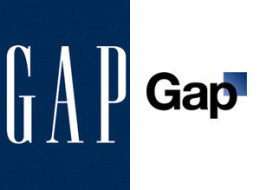After reading the post, I couldn't help but be struck, once again, by how important branding is to a company. I remember last year, or possibly the year before, when Gap attempted to change their logo that they have had for year and years.
 |
| Old logo on the left, new on the right. |
The same can be said of Facebook users. How often does the layout change, and all us users complain about the new layout? How many petitions get started to change things back to the way they were? It only takes a few weeks before we've all adjusted and forgotten about our hatred for this new layout.
Getting back to what you asked, the biggest failure that I can think of is the Netflix/Qwikster ordeal that happened last year. Netflix, in an attempt to create separate companies for their streaming and rental services, decided to split the company into two separate ones. This was a terrible, terrible idea. The reasoning behind the split made sense on a business level, but not on any other. In order to cope with the rising cost of licensing online material and focusing efforts on acquiring said content licenses, Netflix would become a online streaming only service, while Qwikster would be for mail-in DVD rentals.
 |
| Bad idea on top, good idea on bottom. |
As a Netflix user, I was not looking forward to that split. I didn't like the idea of having to menage two queues full of DVDs. Since I still like the mail in DVD service, I didn't want to have to pay two separate companies for those services, and that's what Netflix was basically forcing all it's users to do.
With a lot of customers already upset over the price hike from the summer (a $7 [50%] increase for the 1 DVD at a time, unlimited streaming service), the remaining customers were infuriated. Because of the announced split, Netflix reported a loss of 800,000 members that quarter. That's a lot of money, and a lot of unhappy customers!
My point with this whole long explanation is that Netflix didn't understand their brand, their customers, or their market. What their customers want is a cheap, easy way to watch and rent movies. What those customers don't want is two separate services. Fortunately, CEO Reed Hastings realized his mistake and announced that Netflix won't splint into two companies. Unfortunately, he didn't all his customers back.
What's your opinion on Netflix and their mistake? Have their been any other companies who made near fatal mistakes?
Source: Netflix blog
Source: NY Times
Source: Huffington Post